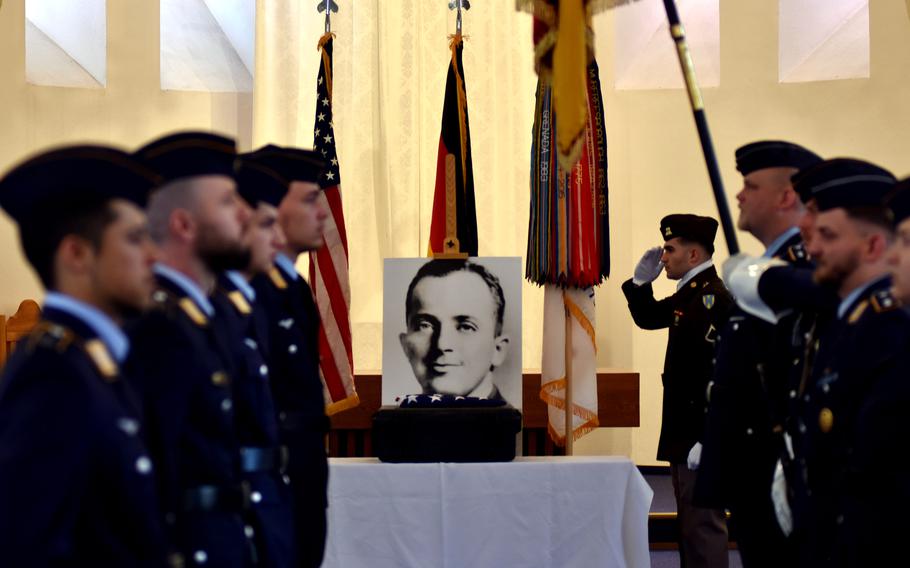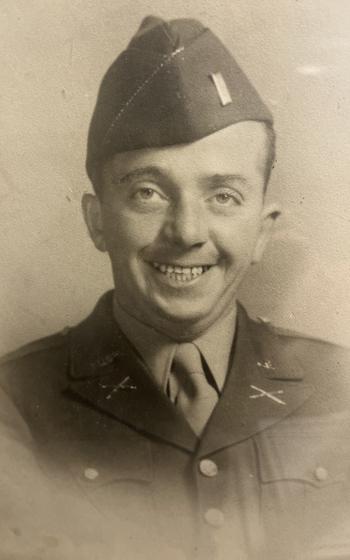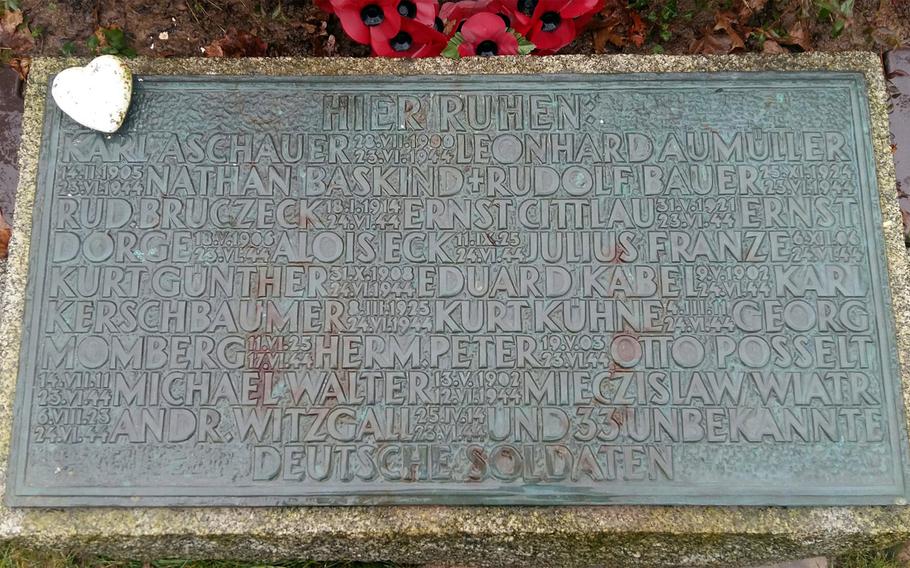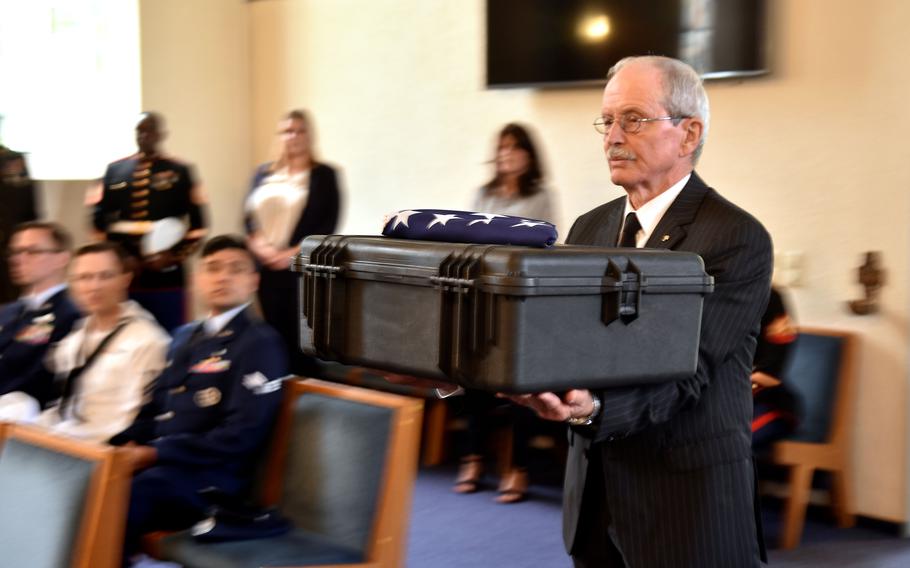
Army 1st Lt. Nathan Baskind receives a final salute during a dignified recovery of remains ceremony at the Landstuhl Regional Medical Center chapel in Germany on Tuesday, May 28, 2024. U.S. Army and German honor guard members paid their respects to Baskind, whose remains were recently recovered from a World War II mass grave in France and identified by a team of experts. (Jennifer H. Svan/Stars and Stripes)
LANDSTUHL, Germany — The remains of a Jewish-American soldier who died in 1944 and was buried in a mass grave with soldiers who fought for the Nazis in occupied France were given to U.S. officials Tuesday during a ceremony at Landstuhl Regional Medical Center.
The case of Army 1st Lt. Nathan Baskind, 28, marks only the second time that a group outside the Defense Department has identified a missing U.S. service member.
The German War Grave Commission in 2023 partnered with two American organizations, the PFC Lawrence Gordon Foundation and Operation Benjamin, to disinter and identify Baskind’s remains, which had first been co-mingled in a mass grave in Cherbourg.
“I am profoundly thankful for the extraordinary lengths that all of those groups have gone to do the unbelievable,” Baskind’s great-niece, Samantha Baskind, said by phone Thursday. The burial “will be a beautiful day for my uncle.”
A resident of Pittsburgh, Baskind survived D-Day but died in a German air force hospital the same day in late June 1944 that he was ambushed and briefly taken prisoner. He was buried with others who perished at the facility.

The remains of U.S. Army 1st Lt. Nathan Baskind, a Jewish-American buried with in a mass grave with soldiers who fought for the Nazis, were transferred to U.S. custody during a ceremony at the Landstuhl Regional Medical Center chapel in Germany on Tuesday, May 28, 2024. (Jed Henry)
Baskind was a platoon commander assigned to the 899th Tank Destroyer Battalion. According to his personnel file, he and another soldier were performing reconnaissance on a road junction south of Cherbourg on June 23 when they were ambushed.
The other soldier, who thought Baskind had died, was seriously wounded but made it back to the unit, the file states. Baskind was reportedly taken to the German military hospital, where he succumbed to his wounds.
After the war, the Germans filed a death and burial report for Baskind, a Defense POW/MIA Accounting Agency statement said May 10. The report said he had died while being treated in an air force hospital at Cherbourg. He was buried in a local military cemetery.
In 1957, the German War Grave Commission, the Volksbund, disinterred remains of what it believed to be 24 Germans from a mass grave in Cherbourg, the DPAA statement said. There, they found items belonging to Baskind.

The name of U.S. Army 1st Lt. Nathan Baskind can be seen in the upper left corner of a tablet marking a mass grave at the Marigny German War Cemetery in Thereval, France. (Jed Henry)
His name was put on a plaque when all the remains were reinterred in another mass grave at the Marigny German War Cemetery in Thereval, 40 miles south.
Baskind’s burial site was a well-known secret among tour guides and researchers operating in the area, said Jed Henry, director of the PFC Lawrence Gordon Foundation, which ultimately identified Baskind’s remains.
The move to disinter and identify Baskind began to pick up steam last year after another U.S.-based nonprofit, Operation Benjamin, successfully lobbied the German ambassador to Israel.
The Germans chose to work with the Gordon Foundation and not the U.S. government because they had no open line of communication with DPAA and were familiar with Henry, who had helped them identify Army Pfc. Lawrence Gordon in 2014, Arne Schrader, Volksbund director of war graves services, said at the ceremony.
Henry helped the French and Germans identify Gordon, who was buried as an unknown in a German cemetery in France, after the U.S. government refused to participate.
Henry believes the Germans chose to work with him on Baskind because they were pressing to complete the task quickly.
“They wanted this done by D-Day,” Henry said. “DPAA is never going to get results that fast.”
In a response Tuesday to a request for comment, a DPAA spokeswoman didn’t specifically address Henry’s remarks.
Henry enlisted a team of specialists, including an anthropologist, a forensic odontologist and DNA firm Bode Technology.
In December, they disinterred 52 sets of remains from the consolidated mass grave at the Marigny German War Cemetery. The grave contained the 24 sets of remains from the original site in Cherbourg.
No skulls were found in the grave, and although the remains were severely degraded, Bode identified a femur and a humerus using DNA comparison.
DPAA accepted the ID on March 8, the statement said. In all, the identification took three months and cost around $50,000, which was paid for by Operation Benjamin.
On Tuesday, Baskind’s remains were carried into the base chapel with a folded American flag resting on top. They were handed over to Army mortuary affairs.
Air Force Capt. Levy Pekar, a Jewish chaplain with the 86th Airlift Wing, provided an invocation while German and U.S. service members looked on. The remains were then carried to a waiting hearse.
“For 80 years, he hasn’t been laid to rest,” Operation Benjamin chief historian Shalom Lamm said after the ceremony. “It was just a matter of finding that needle in the haystack. God’s hand is in this one.”
Baskind will be reburied on June 23 at the Normandy American Cemetery and Memorial in Colleville-sur-Mer.
Stars and Stripes reporter Jennifer H. Svan contributed to this report.

Manfred Hofmeyer, a retired German army brigadier general and board member of the German War Graves Commission, carries a box containing the remains of Army 1st Lt. Nathan Baskind into the Landstuhl Regional Medical Center chapel in Germany on May 28, 2024. The Germans turned over the remains to Army mortuary affairs officials at a dignified recovery of remains ceremony. Baskind will be reburied next month in Colleville-sur-Mer, France. (Jennifer H. Svan/Stars and Stripes)